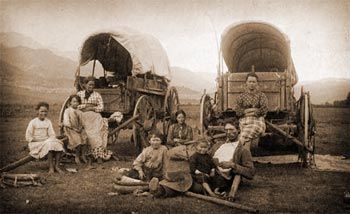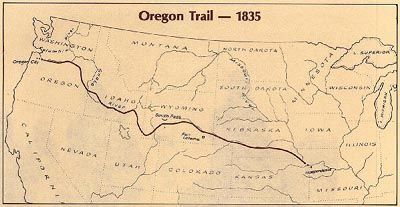|
Teacher Page A WebQuest for a 4th Grade Oregon Trail Unit Designed by Len Updike 
Introduction
| Learners
| Standards
| Process
| Resources
| Evaluation
| Conclusion
| Credits
| Student
Page
This lesson/unit is designed for fourth and/or fifth grade students studying The Oregon Trail. This WebQuest is a great introduction to the process of conducting a research project while learning about the pioneers of the west. The purpose of this webquest is not only to provide the history of how the west was pioneered, but also a source of guided inquiry, stimulating students to think how it must have felt to experience such an adventure. Would you be excited? Sad? Scared? What do you bring? What do you leave? How do you know how to get there if you don't know exactly where it is you are going? These are just some of the questions of those who pioneered the journey west. This WebQuest is designed for fourth and/or fifth grade students exploring the westward expansion of American territory and/or The Oregon Trail.It may be useful to introduce students to the process of researching information, sorting or categorizing information, and proper note taking techniques rather than copying all details. Understanding these skills will make time spent on this WebQuest more efficient. Curriculum Standards This thematically integrated unit/lesson is anchored in the fourth and fifth grade social studies standards of Oregon while integrating reading, writing, math, health, history, maps, geography and creative arts. Social Studies Standards Addressed (Oregon)
As a result of this unit/lesson, students will experience communication, delegation, compromise and teamwork by working with a partner. Students will critically analyze and compare the many choices and feelings pioneers faced by researching pre-selected website links that contain historically accurate maps, facts and diaries of the pioneers. Students will practice the process of researching and sorting information by using the resources within this WebQuest. Students will also be encouraged to use creative problem-solving skills and decision-making skills by choosing how they prefer to create their final presentation, representing what they learned from this WebQuest. This lesson consists of 4 steps for student to follow in the Process section of the student page. The students are asked to 1.) work with a partner 2.) Take notes researching background/overview information 3.) Research and take notes on the many details necessary to plan for their trip west, and 4.) Create a final project to present in any creative format the student chooses, with teacher approval. This WebQuest should be
considered a significant project that extends across multiple class
periods/days. Students should be provided approximately 4-5 periods of
computer time exploring the WebQuest resources, depending on the
structure of class periods. Partners may need 2 periods to organize and
analyze their notes and decide on their creative project. Then,
students should be provided 4-6 periods of class time to work on
their creative presentation projects. Approximately 1-1.5 periods
should be made available for students to present and explain their
projects to the class. The teacher should also plan for closure time to
review unit highlights and relate students' presentations. This unit is
multidisciplinary and thematically integrates many subjects, which may
allow for longer periods of class time. This unit could span
approximately 2.5 weeks. The Student's Tasks:
Follow these steps:
 Background Information America expanding West American West timeline Oregon Trail 3. Now that you have a better idea about where you are going, you can begin to plan for your trip. How do we get there? Look at trail maps Learn about sites along the trail Starting out in Missouri What do we need? List of supplies Price list Choose the right kind of wagon Wagon pictures Oxen, mules or horses Tools Medicine Food Toys and games Considerations Building fires Life and death Dangers Choosing where to go The end of The Oregon Trail The California Gold Rush Oregon & California trails The Mormon Trail Stories and Experiences Pioneer diaries Pioneer memoirs Oregon Trail books Related information Immigrant cultures The Pony Express Expanding the railroad Banking 4. You and your partner will need to decide how you want to present your final project of what you learned about this WebQuest. Remember that you can be as creative as you like. However, you need to have your teacher approve your idea before you begin. Variations / Considerations Students may not have experienced a research project or taking notes. Students may need to be introduced to the concepts of how to gather and find data; how to take notes by paraphrasing highlights rather than copying everything; or how to delegate responsibilities when working with partners or groups on a projects. Spending time on these skills will enhance efficiency in students exposure to research and note-taking on this WebQuest. Teachers should be flexible in allowing and approving students' creative choices of expression through their projects. Allowing student choice and control can increase motivation and participation. Ideally, each pair of students will have access to a computer. If there aren't enough computers for all students to work as partners simultaneously, students may need to use the computers in shifts or some alternating schedule. This will require additional planning and class time for students to have enough time to research information. The teacher may allow students to work on the WebQuest outside of classtime, such as at home; however, not all students may have equal access to computers outside of class time. All students shall be given equal access to class computer time for class requirements.If possible, the teacher should demonstrate the WebQuest site as a demonstration to the class using a projector screen before excusing partners to begin work. The teacher should ensure all students know how to use a mouse and navigate the links. Once students are working in pairs at computers, having extra assistance from aides or parents could be beneficial to ensure questions and assistance to students are addressed timely with minimal waiting. Having books either from
the school library or other sources related to The Oregon Trail or the
Westward Expansion may be useful as additional resources. These
books may also be used if partners must wait to use computers if there
aren't enough computers to use simultaneously.
Allowing students freedom to choose how they creatively present their project can be an important factor to enhancing motivation, and thereby, learning. Students are encouraged to be creative in developing their authentic presentation, highlighting what they learned from this WebQuest. Thank-you to all the websites linked throughout this WebQuest. The information provided throughout these sites allow students to research and experience an important part of American history.Images provided by The Oregon Trail Center and American West.
Last updated on August 15, 1999. Based on a template from The WebQuest Page |